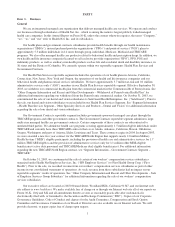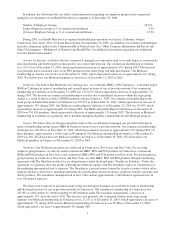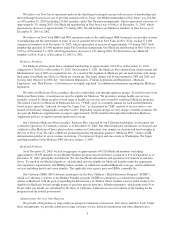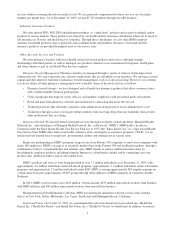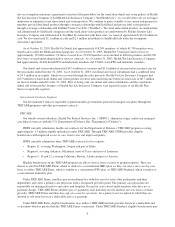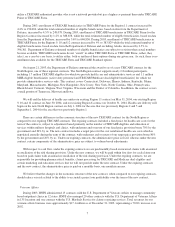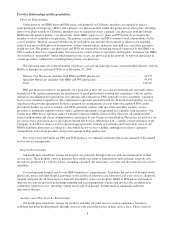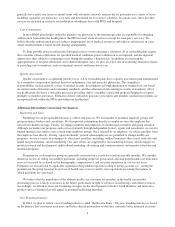Health Net 2003 Annual Report Download - page 13
Download and view the complete annual report
Please find page 13 of the 2003 Health Net annual report below. You can navigate through the pages in the report by either clicking on the pages listed below, or by using the keyword search tool below to find specific information within the annual report.Our HMO in Connecticut competes for business with commercial insurance carriers, Anthem Connecticut, Aetna,
Connecticare, CIGNA and eight other HMOs. Our main competitors in New York and New Jersey are Aetna, Empire
Blue Cross, Oxford Health Plans, United Healthcare and Horizon Blue Cross.
Accreditation
We pursue accreditation for certain of our health plans from the National Committee for Quality Assurance
(“NCQA”), the Joint Committee on Accreditation of Healthcare Organizations (“JCAHO”) and the Utilization Review
Accreditation Commission (“URAC”). NCQA, JCAHO and URAC are independent, non-profit organizations that review
and accredit HMOs. HMOs that comply with review requirements and quality standards receive accreditation. Our
California HMO subsidiary has received NCQA accreditation, our Connecticut, New Jersey and New York subsidiaries
have received JCAHO accreditation and our Arizona subsidiary has received URAC accreditation. Certain of our health
plan subsidiaries are in the process of applying for NCQA or JCAHO accreditation.
Government Regulation
Our business is subject to comprehensive state and federal regulation throughout the United States in the jurisdictions
in which we do business. These laws and regulations restrict how we conduct our businesses and result in additional
burdens and costs to us. We believe we are in compliance in all material respects with all current state and federal laws
and regulations applicable to our business. Certain of these laws and regulations are discussed below.
Federal Legislation and Regulation
Medicare Legislation. On December 8, 2003, the Medicare Prescription Drug, Improvement and Modernization Act
of 2003 (the “MMA”) was signed into law. This complex legislation made many significant structural changes to the
Medicare program. Of special interest to us and other companies with Medicare contracts is that funding has been
increased to the Medicare+Choice program in 2004 and 2005. Under the MMA, the name of the Medicare private market
plans will be changed from Medicare+Choice to Medicare Advantage. The transition for the name change will occur over
2004 and 2005 and become fully effective in 2006. The MMA added a voluntary prescription drug benefit that will be
available to Medicare beneficiaries starting January 1, 2006. Medicare Advantage plans will be able to offer the voluntary
prescription drug benefit. The MMA also authorized a Medicare-endorsed prescription drug card program that will be
offered on a voluntary basis and will provide Medicare beneficiaries access to prescription drug discounts. We have
applied to participate in this program. It is currently expected that these drug cards will be available mid-2004 and will be
in effect until the voluntary prescription drug benefit program is fully implemented in 2006.
The MMA changes the methodology for payment to private plans beginning in 2006, when a form of competitive
bidding among the private plans will begin. The first bids are due in June 2005. The MMA also authorized regional PPOs
and other features with the intent to provide a private market option on a broader scale across the United States. Many
significant parts of this Medicare reform legislation will need to be addressed through the regulatory process. For
example, the geographic boundaries of the regional PPOs are yet to be determined. Drafting of the regulations has begun
and it is expected that regulations will be issued mid-2004. We expect that the regulations will provide many clarifications
to the legislation and a clearer picture of the impact of the MMA will then emerge.
We are engaged in intensive evaluation of this legislation and intend to pursue opportunities either enhanced or
created by the law. In particular, we are pursuing a strategy to reinvest increased funding under the MMA by filing new
benefit plans in certain markets and evaluating the possibility of expanding Medicare+Choice product offerings in certain
markets. We have also restructured our Medicare program management team in an effort to build infrastructure to
capitalize on opportunities presented by the MMA. The restructured Medicare program management team has been
designed to increase our capability for effective execution on growth and cost management initiatives in response to
opportunities presented by the MMA and the Medicare program generally.
HIPAA. The Health Insurance Portability and Accountability Act of 1996 (“HIPAA”) and the implementing
regulations that have been adopted in connection therewith impose new obligations for issuers of health insurance
coverage and health benefit plan sponsors. The purposes of HIPAA are to:
• limit pre-existing condition exclusions applicable to individuals changing jobs or moving to individual coverage,
• guarantee the availability of health insurance for employees in the small group and individual market,
11


